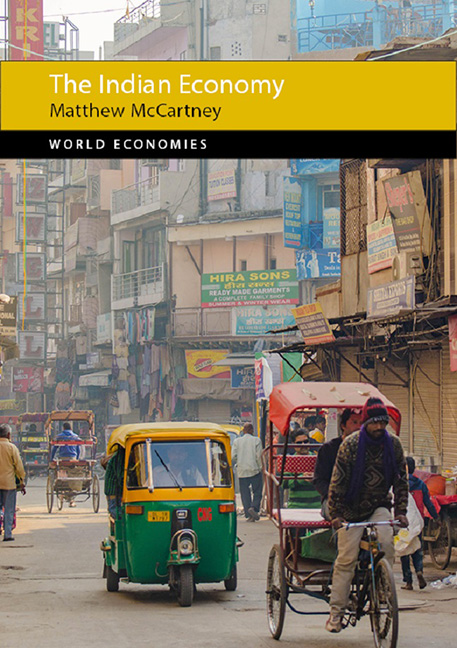Book contents
- Frontmatter
- Dedication
- Contents
- Acknowledgements
- List of Tables and Figures
- Maps
- 1 Introducing the Indian economy, 1947–2017
- 2 The Indian economic story since 1947
- 3 Measuring economic and human development
- 4 The form of the Indian economy
- 5 Human factors in the Indian economy
- 6 Making the Indian economy unique
- Conclusion: prospects for the Indian economy
- References
- Index
6 - Making the Indian economy unique
Published online by Cambridge University Press: 09 August 2023
- Frontmatter
- Dedication
- Contents
- Acknowledgements
- List of Tables and Figures
- Maps
- 1 Introducing the Indian economy, 1947–2017
- 2 The Indian economic story since 1947
- 3 Measuring economic and human development
- 4 The form of the Indian economy
- 5 Human factors in the Indian economy
- 6 Making the Indian economy unique
- Conclusion: prospects for the Indian economy
- References
- Index
Summary
This chapter deals with two key factors that are very specific to the Indian economy: the democratic paradox of public service delivery and the service-sector-led growth puzzle, and also discusses, briefly, the challenge of climate change.
THE DEMOCRATIC PARADOX OF PUBLIC SERVICE DELIVERY
Education is good for economic growth. Education will assist in the adoption of new technology, in attracting FDI and boosting the productivity of labour, as well as more generally in terms of improving the functioning of the democratic process and also of welfare indicators (such as child mortality, fertility and child literacy). In India (see chapter 5) enrolment rates have risen rapidly in recent years but quality measures of Indian schooling remain atrocious. The slow improvement in quantity and the longstanding poor quality of education represents a paradox. Both elites (being able to employ more productive workers and receiving more FDI) and the poor (higher incomes and better health) would benefit from better education. Education is unlike tax-based income redistribution, which imposes a cost on one group (often the richer) to raise the incomes of another group (often the poorer). India is also a democracy in which the poor, rural and illiterate vote more than the rich, urban and educated and where perhaps as many as 70 per cent of the population live on less than $2 per day. So why are politicians not voted in and out of office according to their promise and performance in the delivery of public services, in particular education? Where is the democratic politics of public service delivery in contemporary India? Recall the survey which showed that parents did not view the dire state of education in their village as a pressing problem. In order to answer these questions, we first need to examine whether India’s economic growth has delivered equivalent welfare gains.
Growth without development
The widely-held view is that three decades of rapid economic growth in India has not translated into equivalent welfare gains for all parts of the population, called here “growth without development”.
- Type
- Chapter
- Information
- The Indian Economy , pp. 195 - 232Publisher: Agenda PublishingPrint publication year: 2019



